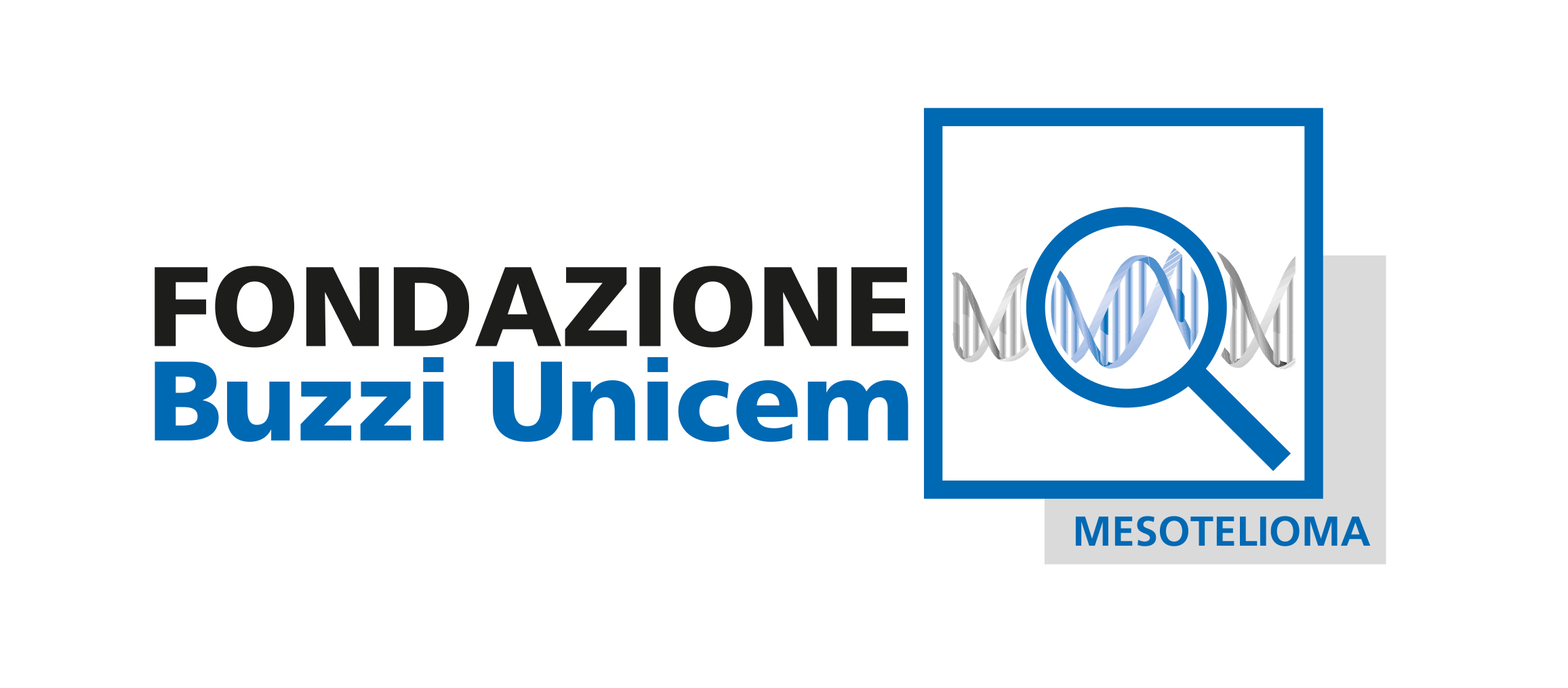Phase II study on the activity of trabectedin in pretreated epithelioid or biphasic/sarcomatoid malignant pleural mesothelioma (mpm)
SUMMARY OF THE RESEARCH PROJECT
FUNDED BY THE BUZZI UNICEM FOUNDATION
PROJECT LEADER:
ATREUS Study
PROJECT STATUS:
Completed
INTRODUCTION
There is currently no 2nd-line therapy available for epithelioid malignant pleural mesothelioma (MPM), with the exception of patients who have demonstrated a response to a 1st-line regimen of platinum derivatives and pemetrexed for a period of at least six months, in which case a rechallenge with the same therapy may be effective. Sarcomatoid or biphasic types of mesothelioma are usually chemotherapy-resistant, and an effective 1st-line treatment for these histotypes remains an unmet need.
Trabectedin is a drug that binds to the minor groove of DNA, alkylating guanine at the N2 position and with an original mechanism of action involving the nucleotide excision repair machinery. It also interferes with transcription regulation in a gene- and promoter-dependent manner and has an anti-inflammatory effect by modulating the production of cytokines, chemokines and growth factors by the tumor macrophages.
Trabectedin is the first natural compound of marine origin that has been approved for clinical use as an antitumor agent, and is the prototype of a new class of drugs that can act directly against both neoplastic cells and the tumor micro-environment through an anti-inflammatory effect due to its ability to modulate the production of cytokines, chemokines and growth factors by the tumor macrophages.
Preclinical data on the anti-inflammatory and anti-tumoral effects of trabectedin are of particular interest because inflammation is an intrinsic mechanism of resistance expressed by mesothelioma tumor cells.
Several studies investigating the inflammatory and anti-tumoral activity of trabectedin are also of particular interest because inflammation is an intrinsic characteristic of mesothelioma.
The researchers involved in this project are evaluating the activity of trabectedin in MPM due to its special mechanism of action and the clinical and preclinical data which indicate that it may be effective against tumors that are unresponsive to traditional chemotherapy.
Trabectedin has already been approved in Europe for the treatment of soft tissue sarcomas and pretreated advanced ovarian cancer. It will be investigated in this study after the failure of 1st-line treatment in epithelioid forms of mesothelioma and as initial treatment in some particularly aggressive forms, such as sarcomatoid mesothelioma.
The Oncology Department of the Mario Negri Institute directed by Maurizio D’Incalci will also collaborate in the study. With support from the Buzzi Unicem Foundation, the Institute will initiate a program to determine several biomolecular aspects to identify potentially useful predictive factors with the goal of improving patient selection.
THE STUDY
This is a non-randomized, multicenter Phase II study for patients with inoperable epithelioid MPM that has been pretreated with pemetrexed and platinum derivatives, or for treatment-naive or pretreated patients with sarcomatoid or biphasic MPM.
Enrolled patients will be treated with trabectedin (1.3 mg/m2), administered by IV infusion every three weeks until disease progression or the appearance of side effects to the extent that treatment must be discontinued.
The primary objective is to evaluate the efficacy of trabectedin in epithelioid MPM patients who have relapsed after treatment with pemetrexed and platinum derivatives.
The secondary objectives are to evaluate the efficacy, tolerability and safety of trabectedin, in addition to its effect on several biomarkers of MPM.
Below are the inclusion and exclusion criterial for the study.
Inclusion criteria
- Cytological or histological diagnosis of inoperable MPM;
- Aged >18 years;
- Performance status 0-2 (ECOG);
- Disease measurable by CT or PET;
- Adequate bone marrow reserve;
- Adequate hepatic and renal functions;
- Completion of one prior treatment (pemetrexed and platinum derivatives);
- Completion of the last treatment cycle at least three weeks prior to enrollment;
- Full recovery from any side effects from the previous treatment (grade ≤1);
- Life expectancy of >3 months;
- Signed informed consent.
- Patients who have received palliative radiotherapy are eligible if a <30% portion of the bone marrow has been irradiated and their hematological conditions are normal;
- Effective method of birth control for male patients whose partners are of child bearing potential for the entire duration of the study and up to three months after treatment with trabectedin has been stopped
Exclusion criteria
- Radiotherapy with intent-to-cure of the thoracic wall (concomitantly or prior to chemotherapy);
- Adjuvant chemotherapy;
- Severe concomitant diseases;
- Decompensated diabetes mellitus or any other contraindication against the use of dexamethasone (used at the dosage of 20 mg as pre-medication);
- Participation in other clinical trials;
- Female patients of child bearing age/potential;
- Previous treatment with trabectedin;
- Presence of other neoplastic diseases (with the exception of adequately treated basal cell carcinoma or carcinoma of the uterine cervix in situ), unless they have been in remission for at least five years and deemed of negligible potential for relapse;
- Active viral hepatitis or chronic hepatopathy;
- Unstable heart disease including: cardiac insufficiency, angina pectoris, myocardial infarction in the year prior to enrollment, uncontrolled hypertension or arrythmia;
- Active infectious disease;
- Other concomitant/severe diseases;
- Cerebral involvement and/or meningitis.
